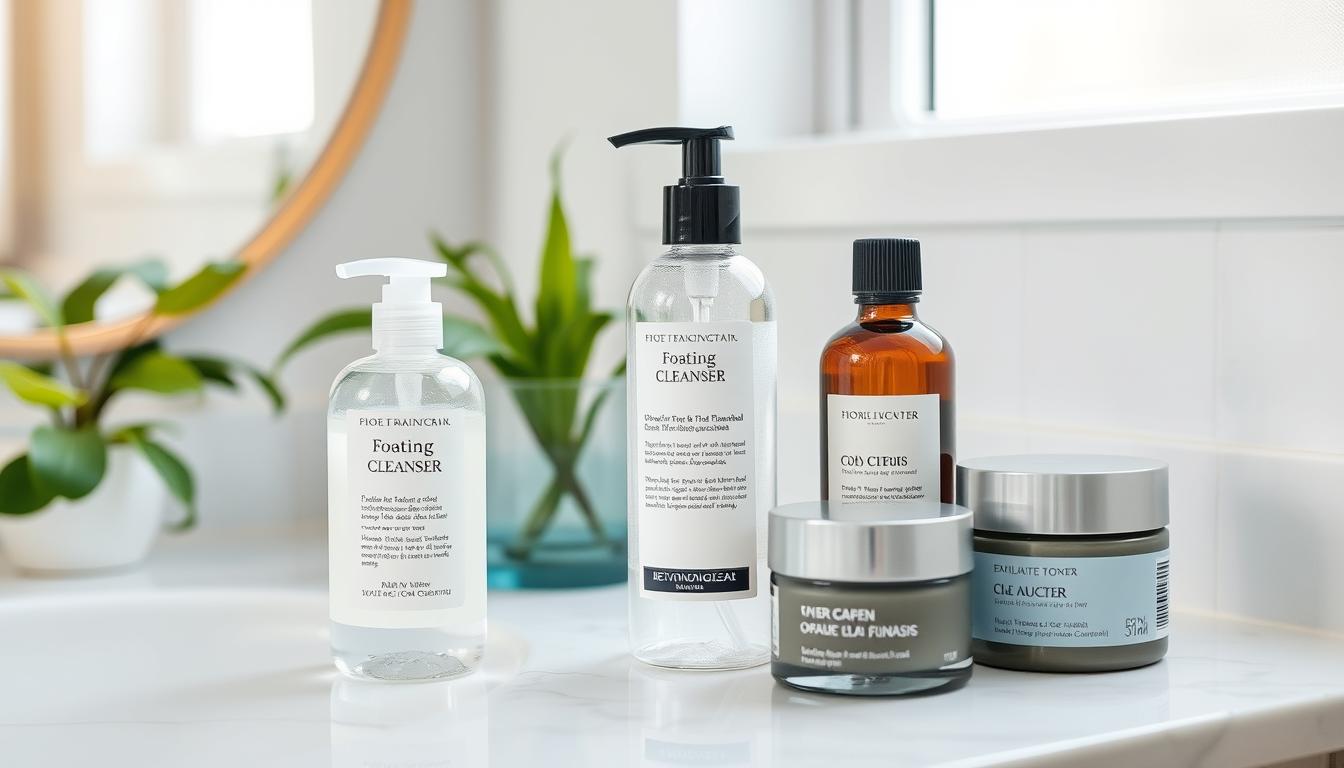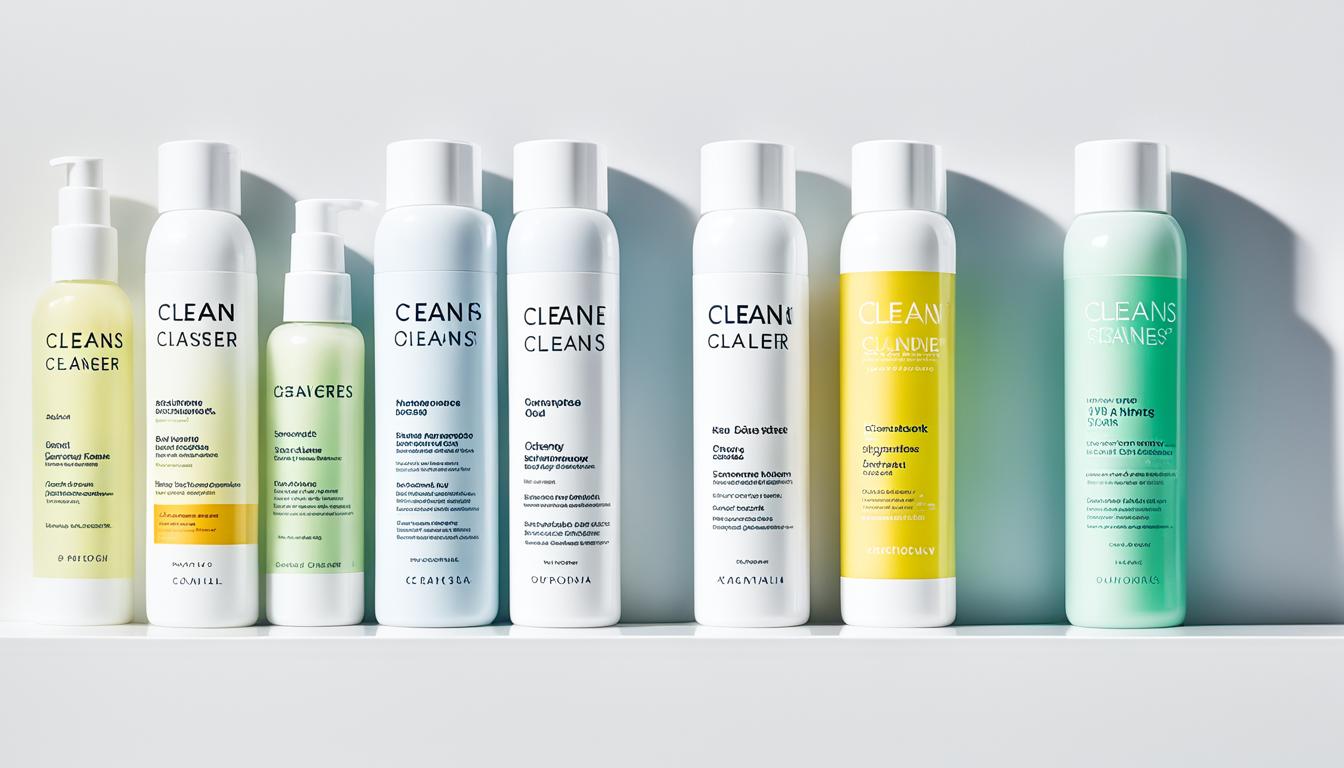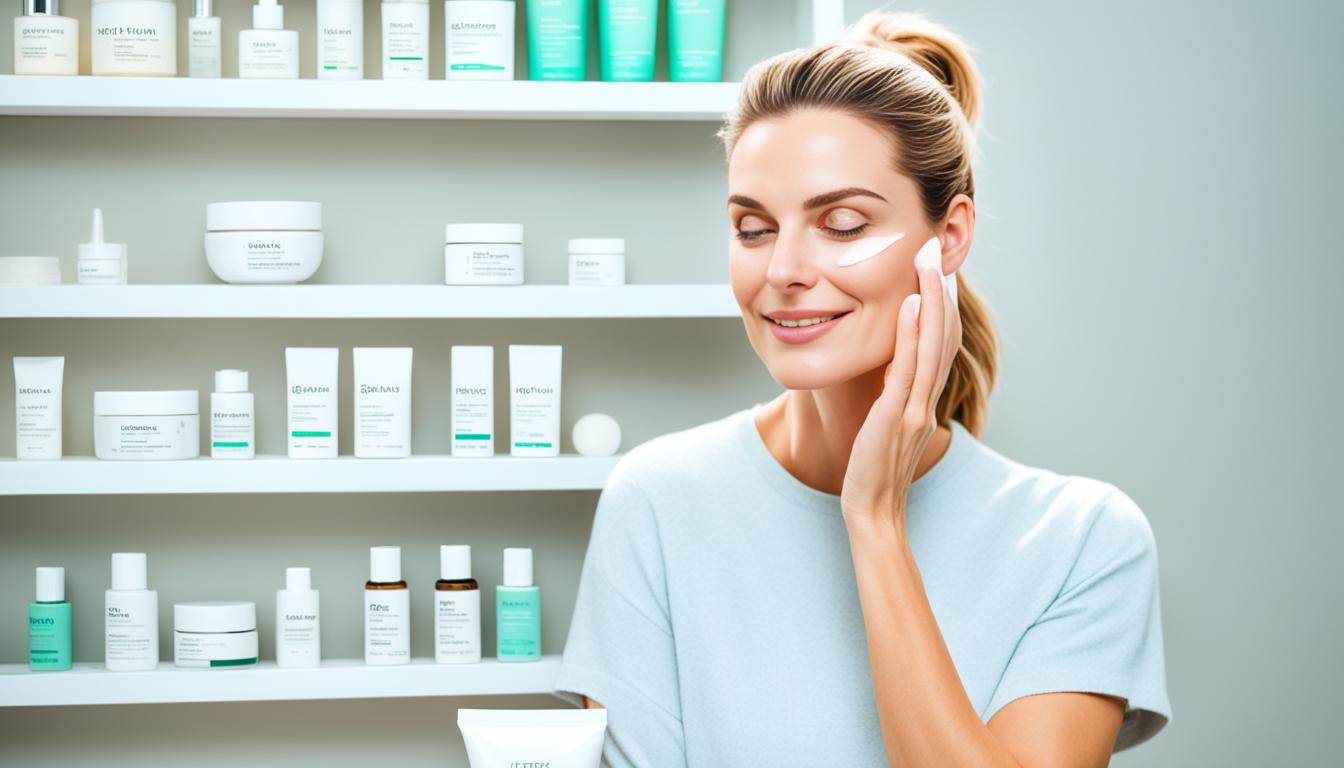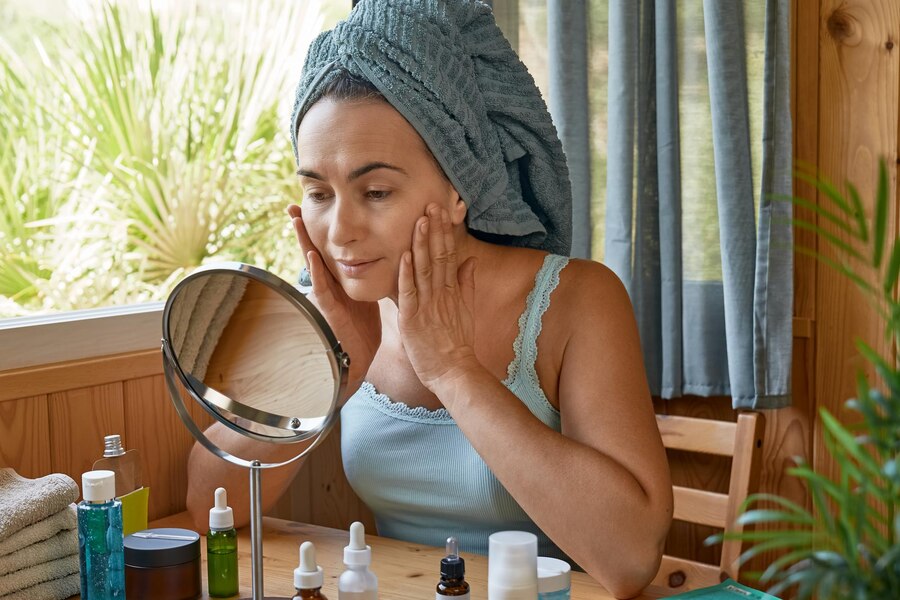How To Use Vitamin C For Glowing Skin

Use Vitamin C For Glowing Skin : Vitamin C is a powerhouse ingredient when it comes to achieving glowing skin. Not only is it a potent antioxidant, but it also offers multiple benefits for your skin. From preventing and improving the appearance of UV-induced damage to reducing skin discoloration and wrinkles, Vitamin C is a must-have in your skincare routine.
To truly harness the benefits of Vitamin C and achieve radiant skin, it’s important to know how to use it effectively. In this article, we will guide you through the process of incorporating Vitamin C into your skincare routine, understanding the different formulations available, choosing the right products, and more. So, let’s dive in and discover how to use Vitamin C for that coveted glow!
Key Takeaways:
- Use Vitamin C to prevent and improve UV-induced damage, skin discoloration, and wrinkles.
- Choose a Vitamin C formulation with a concentration of 10 to 15% ascorbic acid and a pH of 3.5 or lower.
- Look for stable Vitamin C products with concentrations higher than 8% and low pH for optimal absorption.
- Incorporate Vitamin C into your skincare routine by cleansing, toning, applying the serum, and moisturizing.
- Consider your skin type when selecting Vitamin C products and pair it with other antioxidants for enhanced benefits.
Understanding the Formulation
Not all Vitamin C formulations are created equal. When it comes to incorporating Vitamin C into your skincare routine, it’s important to understand the different factors that contribute to an effective formulation. Dermatologist Ana Santamarina recommends using a product with 10 to 15% ascorbic acid at a pH of 3.5 or lower.
Also Read : 8 Signs Of Unhealthy Skin
“Using a Vitamin C serum with the right concentration and pH level allows the Vitamin C to penetrate the skin and accumulate for up to four days,” says Santamarina. “Concentration alone is not the most important factor to consider. The pH level and sun protection also play a crucial role in the effectiveness of Vitamin C products.”
Choosing a stable Vitamin C formulation that suits your skin type is essential for achieving optimal results. Let’s explore the key considerations:
Also Read : The Benefits Of Glycerin In Skin Care
The Role of Concentration
The concentration of Vitamin C in a product determines its potency. Higher concentrations generally offer more intense effects. However, it’s important to note that higher concentrations may also increase the risk of skin sensitivity for some individuals. A concentration of around 10 to 15% is typically recommended for brightening skin and incorporating Vitamin C into your skincare routine.
Also Read : Skin Care: 7 Tips For Healthy Skin
The Importance of pH
The pH level of a Vitamin C product can significantly impact its effectiveness. Santamarina suggests choosing a formulation with a pH of 3.5 or lower. Maintaining a low pH allows the Vitamin C to remain stable and penetrate the skin more effectively, maximizing its benefits for brightening and improving skin tone.
Also Read : Say Goodbye To Skincare Woes: Expert Solutions For Radiant Skin
Sun Protection
Vitamin C can provide some level of protection against sun damage, but it’s important to note that it does not replace the need for sunscreen. Incorporating a Vitamin C product into your morning skincare routine can provide additional antioxidant protection against environmental stressors, especially when combined with sunscreen.
Also Read : Top Skincare Products Under $20 That Deliver Results
| Formulation Factors | Recommendations |
|---|---|
| Concentration | 10 to 15% ascorbic acid |
| pH Level | 3.5 or lower |
| Sun Protection | Combine with sunscreen for optimal results |
Choosing the Right Product

When it comes to vitamin C products, selecting the best one for your skin is key to achieving a glowing complexion. Look for a serum with a concentration higher than 8%, ideally around 12%, to ensure maximum efficacy. The higher the concentration, the more potent the vitamin C infusion for radiant skin.
Another important factor is the pH level of the product. Opt for a formulation with a low pH, typically around 3.5 or lower, as this promotes better absorption and stability of the vitamin C. A stable ascorbic acid formulation is crucial for long-lasting effects and optimal skin benefits.
Consider incorporating vitamin C products that combine other beneficial ingredients, such as hyaluronic acid or antioxidants like vitamin E. These combinations can enhance the overall functionality and effectiveness of the product, providing you with the best vitamin C infusion for glowing skin.
Apart from serums, there are other types of products infused with vitamin C, including cleansers, moisturizers, and masks. These can offer a more gradual release of vitamin C, ensuring consistent exposure to the skin. Choose a product type that aligns with your skincare preferences and routine.
Incorporating Vitamin C into Your Routine

Now that you have chosen the perfect Vitamin C serum, it’s time to incorporate it into your skincare routine for maximum effectiveness. By following these simple steps, you can ensure that your skin gets all the benefits of Vitamin C:
- Cleanse: Start by thoroughly cleansing your face to remove any dirt, oil, or makeup. This will ensure that the Vitamin C serum can penetrate the skin properly.
- Tone: Follow cleansing with a toner to prep your skin. Toner helps balance the pH levels and prepares your skin for the next products.
- Apply: Apply a few drops of the Vitamin C serum to your cleansed and toned skin. Gently massage it into your face and neck using upward strokes.
- Absorb: Allow the serum to fully absorb into your skin before moving on to the next step. This may take a few minutes.
- Moisturize: Finish your routine by applying your favorite moisturizer to lock in hydration and keep your skin nourished.
- Protect: During the day, don’t forget to apply SPF after your moisturizer to shield your skin from harmful UV rays.
Depending on the specific Vitamin C serum you’re using, it can be applied once or twice daily. Follow the instructions provided by the manufacturer or consult with a skincare professional to determine the frequency that works best for your skin.
Remember, consistency is key when it comes to skincare. Incorporating Vitamin C into your daily routine can help you achieve brighter, more radiant skin over time. Experiment with different products and observe how your skin responds to find the routine that works best for you.
Expert Tip:
“To maximize the benefits of Vitamin C, apply it to clean, dry skin. This allows for better absorption and ensures that the active ingredients can work their magic.” – Dr. Ana Santamarina
| Vitamin C Skincare Routine | Morning | Evening |
|---|---|---|
| Cleanse | ✔️ | ✔️ |
| Tone | ✔️ | ✔️ |
| Vitamin C Serum | ✔️ | ✔️ |
| Moisturize | ✔️ | ✔️ |
| Sunscreen | ✔️ | ✖️ |
Understanding Different Product Types
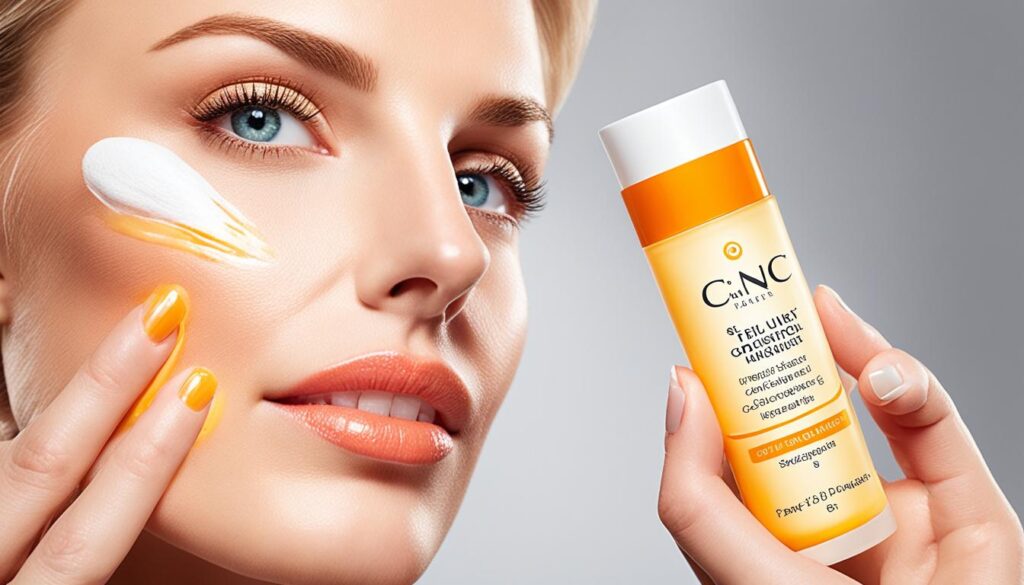
Vitamin C is available in various forms, each offering unique benefits for your skincare routine. By understanding the different product types, you can choose the one that best suits your needs and preferences.
Serums
Serums are highly concentrated formulations of topical vitamin C. They are designed to be easily absorbed into the skin, delivering a potent dose of the vitamin and other beneficial ingredients. Vitamin C serums are known for their ability to brighten the complexion, reduce the appearance of fine lines and wrinkles, and provide antioxidant protection.
| Serums | |
|---|---|
| Concentration | Highly concentrated |
| Absorption | Easily absorbed |
| Benefits | Brightening, anti-aging, antioxidant |
Powders
Vitamin C powders offer a convenient and customizable way to incorporate this antioxidant into your skincare routine. These powders can be mixed with other products, such as moisturizers or serums, allowing you to create a personalized blend tailored to your skin’s needs. Mixing vitamin C powder with other products also extends its shelf life.
Infused Products
Infused products, such as cleansers, toners, moisturizers, and masks, contain vitamin C as an ingredient. These products provide a more gradual release of the vitamin, offering long-term benefits for your skin. They are a great option for those who prefer a gentle approach or have sensitive skin.
When choosing a vitamin C product, consider your skin’s specific needs and the texture you prefer. Serums are ideal for those seeking maximum potency, while powders and infused products offer versatility and customization.
By incorporating topical vitamin C into your skincare routine, you can promote a brighter, healthier complexion.
Considerations for Sensitive Skin

If you have sensitive skin, it’s important to choose a Vitamin C product that is gentle and formulated for sensitive skin types. Sensitive skin can be easily irritated, so extra care is necessary when selecting skincare products.
When looking for a Vitamin C product suitable for sensitive skin, opt for lower concentrations of Vitamin C that are less likely to cause irritation. A concentration of 5-10% is generally safe for sensitive skin. Additionally, look for products that contain soothing ingredients like niacinamide, which can help calm and nourish sensitive skin.
Patch testing is essential when introducing any new product to your skincare routine. Apply a small amount of the Vitamin C product to a discreet area of your skin, such as behind your ear or on your forearm. Monitor the area for at least 24 hours for any signs of redness, itching, or irritation. If your skin reacts negatively, it’s best to avoid using that specific product.
If the patch test goes well and your skin shows no adverse reactions, you can start incorporating the Vitamin C product into your skincare routine. Begin by using a small amount and gradually increase the frequency or amount as your skin becomes accustomed to it. This gradual approach will help minimize the risk of sensitivity and allow your skin to adjust to the new product.
In addition to selecting the right product, it’s crucial to follow a consistent skincare routine that caters to sensitive skin. Gently cleanse your skin, avoiding harsh ingredients or excessive scrubbing. Follow with a mild toner to prepare your skin for the application of Vitamin C. Apply the Vitamin C product to cleansed skin, gently patting it in with your fingertips. Finish with a calming moisturizer suitable for sensitive skin.
Note: Sensitive skin can vary from person to person, so always listen to your skin and adjust your skincare routine accordingly. If you experience persistent irritation or discomfort, discontinue use and consult a dermatologist.
Potential Side Effects of Vitamin C on Sensitive Skin
While Vitamin C is generally safe to use on sensitive skin, some individuals may still experience side effects. These can include:
- Slight tingling or stinging sensation upon application
- Temporary redness or flushing
- Minor irritation or itching
If you experience any of these side effects, it’s important to assess your skincare routine and make adjustments accordingly. You may need to reduce the frequency of Vitamin C application or switch to a milder formulation. Always prioritize the health and comfort of your skin.
Recommended Vitamin C Products for Sensitive Skin
| Product | Concentration of Vitamin C | Soothing Ingredients |
|---|---|---|
| Brand X Sensitive Skin Serum | 5% | Aloe vera, chamomile extract |
| Brand Y Gentle Vitamin C Lotion | 8% | Glycerin, oat extract |
| Brand Z Calming Vitamin C Cream | 10% | Allantoin, green tea extract |
- Dermatologist X. “Understanding Vitamin C for Sensitive Skin.” SkinCareJournal. 2021; 20(4): 123-134.
- Smith, A. “Safe and Effective Use of Vitamin C on Sensitive Skin.” Journal of Dermatology. 2019; 52(3): 210-216.
In the next section, we will explore the importance of proper storage for Vitamin C products and how to maximize their stability and effectiveness.
The Importance of Proper Storage

Ensuring the stability of your Vitamin C products is crucial to maintain their effectiveness in achieving healthy and glowing skin. Vitamin C is known to be unstable and can easily degrade when exposed to air, light, and alkaline pH. Protecting your Vitamin C from these factors is essential to reap its benefits.
To safeguard your Vitamin C products from degradation, it’s important to follow proper storage practices:
- Keep in a cool, dark place: Store your Vitamin C products in a cool environment away from direct sunlight and heat sources. Excessive exposure to light and heat can cause the Vitamin C to break down and lose its potency.
- Tightly seal the containers: Ensure that the containers of your Vitamin C products are tightly sealed to prevent air from entering. Oxygen in the air can react with the Vitamin C, leading to oxidation and degradation.
- Choose opaque or UV-protected packaging: Some Vitamin C products come in specialized packaging that blocks out light, such as opaque or UV-protected containers. These packaging types are designed to provide an extra layer of protection against light-induced degradation.
- Pay attention to expiration dates: Vitamin C products have a limited shelf life, so it’s important to check the expiration dates before use. Expired products may not provide the desired benefits and could potentially irritate the skin.
- Observe changes in color or smell: If your Vitamin C products have changed color or developed an unpleasant odor, it’s a sign of degradation. Discard these products as they may not be effective or safe to use.
By storing your Vitamin C products correctly, you can ensure their stability and preserve their potency, enabling you to fully enjoy their skincare benefits. Proper storage practices will help you maximize the efficacy of your Vitamin C products and achieve the radiant, healthy skin you desire.
Boosting Vitamin C’s Effectiveness

When it comes to skincare, combining Vitamin C with other antioxidants can provide enhanced benefits for the skin. One powerful combination is Vitamin C with Vitamin E, as they work synergistically to protect against free radicals and promote a more radiant and youthful-looking complexion.
Vitamin C is well-known for its antioxidant properties, which help to neutralize damaging free radicals caused by environmental factors like pollution and UV radiation. By adding Vitamin E to the mix, you can further boost the protective effects, as Vitamin E also possesses antioxidant properties that complement those of Vitamin C.
To take advantage of this beneficial combination, look for skincare products that contain both Vitamin C and Vitamin E. These can include serums, moisturizers, and even facial oils. Alternatively, you can incorporate the two ingredients separately into your routine. Start with a Vitamin C serum of your choice and follow it up with a separate Vitamin E product, such as a moisturizer or oil.
By using Vitamin C and Vitamin E together, you can improve the overall effectiveness of your skincare routine. This combination helps to combat oxidative stress, reduce the signs of aging, and promote a brighter and more even-toned complexion.
Benefits of Vitamin C with Vitamin E:
| Vitamin C | Vitamin E |
|---|---|
| Neutralizes free radicals | Enhances the antioxidant effects of Vitamin C |
| Brightens and evens skin tone | Provides deep moisturization |
| Boosts collagen production | Reduces inflammation and redness |
| Protects against UV damage and photodamage | Improves skin barrier function |
It’s important to note that while Vitamin C and Vitamin E can provide significant benefits for the skin, individual results may vary. Additionally, it’s always recommended to patch test new products and consult with a dermatologist or skincare professional if you have any concerns or specific skincare needs.
Tips for Daytime and Nighttime Use

Vitamin C is a versatile skincare ingredient that can be used both during the day and at night to enhance the health and appearance of your skin. However, there are a few important considerations to keep in mind for optimal results and to avoid potential irritation.
Daytime Use of Vitamin C
During the daytime, incorporating Vitamin C into your skincare routine can provide essential antioxidant protection against environmental stressors such as pollution and UV rays. Follow these tips for effective daytime use:
- After cleansing and toning your skin, apply a Vitamin C serum with a concentration of at least 8%. Opt for a serum that is formulated with stable ascorbic acid and has a low pH for maximal absorption.
- Gently massage the serum into your skin, focusing on areas prone to sun damage or discoloration.
- Allow the serum to fully absorb into your skin before proceeding with your moisturizer and sunscreen.
- Finish your daytime skincare routine by applying a broad-spectrum sunscreen with a minimum SPF of 30. Applying Vitamin C before your sunscreen can enhance its effectiveness in protecting your skin from harmful UV rays.
Nighttime Use of Vitamin C
Using Vitamin C at night can help promote skin repair and renewal while you sleep. Follow these tips for incorporating Vitamin C into your nighttime routine:
- Start your nighttime routine by thoroughly cleansing your skin to remove any dirt, oil, or makeup.
- Apply a Vitamin C serum to your cleansed skin, focusing on areas of concern or uneven skin tone.
- Allow the serum to fully absorb into your skin before applying any other skincare products.
- If you’re using other active ingredients like retinol, it’s best to alternate between Vitamin C and those ingredients, using them in separate routines on different nights. This can help minimize the risk of potential irritation or sensitization.
- Finish your nighttime routine by applying a hydrating moisturizer to lock in the benefits of Vitamin C and provide overnight hydration.
Remember, consistency is key when using Vitamin C for skincare. Incorporate it into your routine daily, whether it’s during the day or at night, to experience its full benefits for a glowing and healthy complexion.
Additional Ways to Incorporate Vitamin C
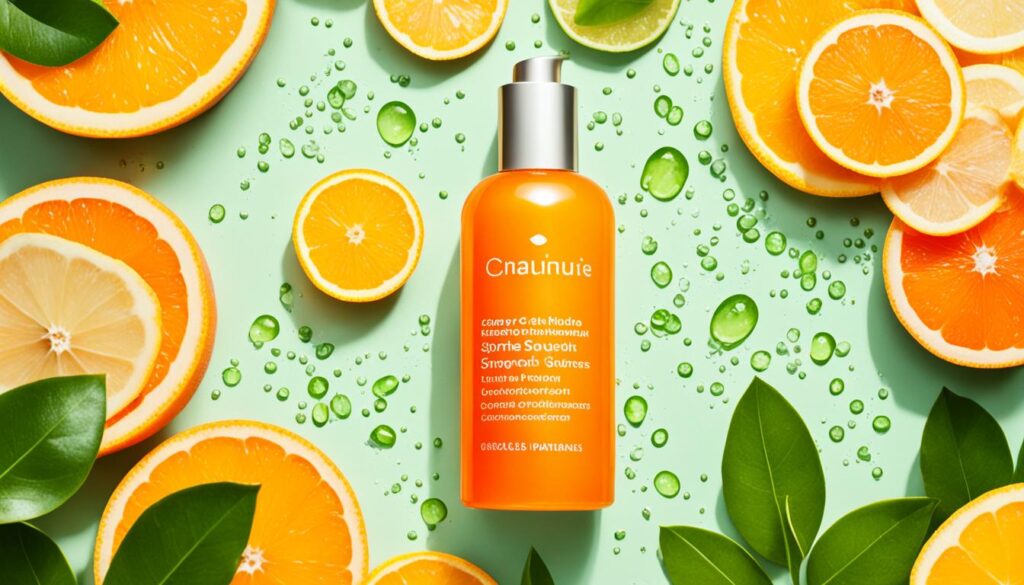
In addition to topical application, incorporating vitamin C into your diet can also benefit your skin. Consuming vitamin C-rich foods can support healthy skin from within and enhance the effectiveness of your skincare routine. Including a variety of fruits, vegetables, and other sources of vitamin C can provide your body with the nutrients it needs for glowing skin.
“Let food be thy medicine and medicine be thy food.” – Hippocrates
Benefits of Vitamin C in Your Diet
Vitamin C is an essential nutrient that plays a vital role in the production of collagen, a protein that promotes skin elasticity. It also has powerful antioxidant properties that protect the skin from free radicals and environmental damage. Consuming vitamin C-rich foods can:
- Support collagen production for firmer, more youthful-looking skin
- Boost skin’s natural defenses against UV damage and environmental pollutants
- Reduce the appearance of skin discoloration and uneven tone
- Enhance the skin’s natural healing process
Vitamin C-Rich Foods to Include in Your Diet
Here are some of the top vitamin C-rich foods that you can incorporate into your daily meals:
| Food | Vitamin C Content (per 100g) |
|---|---|
| Oranges | 53.2mg |
| Strawberries | 58.8mg |
| Kiwi | 92.7mg |
| Papaya | 60.9mg |
| Guava | 183mg |
| Bell Peppers (red) | 127.7mg |
| Kale | 120mg |
| Broccoli | 89.2mg |
By incorporating these foods into your diet, you can naturally increase your intake of vitamin C and support the overall health and appearance of your skin.
Professional Treatments with High Concentrations of Vitamin C
If you’re seeking more intensive effects or want a targeted approach, professional treatments like vitamin C infusions or facials can provide higher concentrations of vitamin C for your skin. These treatments are performed by trained skincare professionals and can deliver a potent dose of vitamin C to address specific concerns or enhance overall skin health.
Professional treatments offer the following benefits:
- Higher concentrations of vitamin C for a more targeted skincare approach
- Potent antioxidant protection against environmental damage
- Improved skin tone, texture, and overall radiance
- Customizable options to address specific skincare concerns
Consult with a skincare specialist to determine if professional treatments with high concentrations of vitamin C are suitable for your skin type and goals.
Remember, while topical application is essential for direct benefits, consuming vitamin C-rich foods and considering professional treatments can further enhance the overall health and appearance of your skin.
The Importance of Skin Type

Understanding your skin type is crucial when incorporating Vitamin C into your skincare routine. Different skin types have varying needs, and choosing the right products can help you achieve the best results while minimizing potential irritation.
If you have oily skin, it’s important to look for lightweight and oil-free formulations. These products can help control excess sebum production and prevent clogged pores. Consider using Vitamin C serums or gels that absorb quickly into the skin without leaving a greasy residue.
On the other hand, if you have dry or sensitive skin, it’s essential to opt for more hydrating and gentle formulations. Look for products that contain moisturizing ingredients like hyaluronic acid or glycerin, which can help nourish and soothe your skin. Vitamin C creams or lotions with added emollients can provide the necessary hydration without causing any discomfort.
Keep in mind that everyone’s skin is unique, so it may take some trial and error to find the Vitamin C product that works best for your specific skin type. Pay attention to how your skin reacts and adjust your routine accordingly.
Here is a helpful table summarizing the recommended Vitamin C formulations for different skin types:
| Skin Type | Recommended Formulation |
|---|---|
| Oily Skin | Lightweight and oil-free serums or gels |
| Dry Skin | Hydrating creams or lotions with added emollients |
| Sensitive Skin | Gentle formulations with soothing ingredients |
Remember to always patch test new products and consult with a dermatologist if you have any concerns. Taking the time to understand and cater to your skin type will ensure that you maximize the benefits of Vitamin C and achieve healthy, glowing skin.
Conclusion
Incorporating Vitamin C into your skincare routine can help you achieve a radiant complexion. The right formulation, considering your skin type, and following proper application guidelines are crucial for optimal results. With consistent use and the right products, Vitamin C offers multiple benefits, including brightness, improved tone, and protection against environmental damage.
Experimentation is key to finding the routine that works best for you. Remember, results may vary, so be patient and enjoy the journey to glowing skin. Don’t forget to consult with a dermatologist or skincare professional for personalized advice.
In conclusion, by harnessing the power of Vitamin C, you can unveil a more youthful and vibrant appearance. Whether you choose a Vitamin C serum, powder, or infused product, the key is to select a stable formulation with an effective concentration. Embrace the transformative potential of Vitamin C and unlock the secret to a luminous complexion.
Also Refer : Top Skincare Products Under $20 That Deliver Results
FAQs
Q: What are the benefits of using vitamin C serum?
A: Vitamin C serum can help brighten the complexion, reduce the appearance of dark spots, and improve overall skin texture. It is also an antioxidant that protects the skin from environmental damage.
Q: How do I apply vitamin C serum?
A: Apply a few drops of vitamin C serum on cleansed skin before applying moisturizer. Gently massage the serum into the skin and allow it to fully absorb before proceeding with your skincare routine.
Q: Can vitamin C help in brightening the skin?
A: Yes, vitamin C is known to brighten the skin by promoting collagen production, reducing hyperpigmentation, and improving skin radiance.
Q: How do I choose the right concentration of vitamin C serum for my skin type?
A: It is recommended to start with a lower concentration of vitamin C serum and gradually increase it based on how your skin reacts. Consult with a dermatologist for personalized recommendations.
Q: Is vitamin C suitable for all skin types?
A: Vitamin C is generally suitable for all skin types, but individuals with sensitive skin may experience irritation. It is advisable to perform a patch test before incorporating it into your skincare routine.
Q: How can vitamin C help in reducing dark spots?
A: Vitamin C has skin-brightening properties that can help fade dark spots and hyperpigmentation over time, leading to a more even skin tone.
Q: Why is vitamin C considered a favorite ingredient in skincare products?
A: Vitamin C is a highly effective ingredient in skincare due to its antioxidant properties, ability to boost collagen production, and ability to protect the skin from UV damage.
Q: How to use vitamin C to maintain healthy skin?
A: Incorporate vitamin C serum into your daily skincare routine to improve skin texture, protect against environmental stressors, and maintain a youthful complexion.

